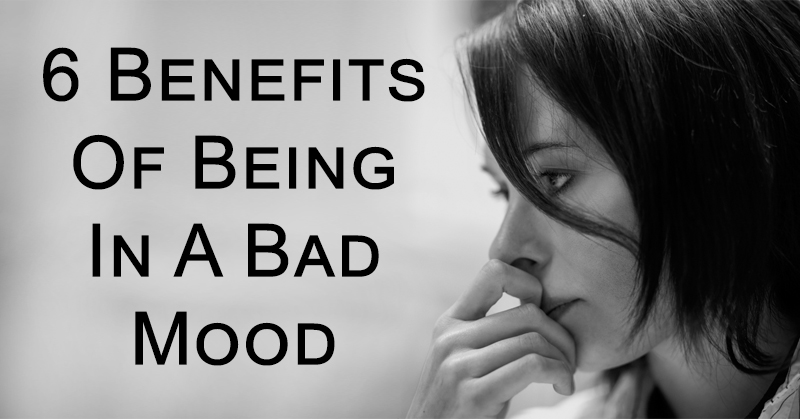You’ve probably read plenty of articles and heard many discussions on how negative thoughts can steal your joy and destroy your inner peace. While that’s the truth, it turns out that being in a bad mood might also have a few positive consequences. Joe Forgas, a social psychologist, has spent years studying sadness. In the latest issue of Current Directions in Psychological Science, he discovered something that might surprise you. Being in a bad mood can actually improve your thinking and increase your motivation.
Here are six benefits of being in a bad mood:
1. It Improves Your Memory
One one study, participants were tested for their memory of the details of a shop they had just visited. Researchers found that the participants who visited the shop on cold, gloomy days remembered more details, compared to those who visited on warm, sunny days. These results suggest that sad people are more likely to pay attention to their environment, while happy people are more likely to go with the flow.

2. It Reduces Stereotyping
Forgas and his team asked participants to play a “shoot-don’t shoot” game. The goal is to play a police officer who is tasked with shooting any bad guys holding guns. Half of the targets were wearing Muslim headgear. The researchers found a general tendency to shoot more at the targets who were wearing Muslim headgear, and this tendency was magnified among people who were feeling happy.
3. It Increases Motivation
Researchers found that people in a sad mood are more likely to persist at a difficult task. Happy people are more likely to quit a difficult task or to handicap themselves by drinking a beverage that could hurt their performance. This suggests that being in a bad mood could help give you motivation to complete a difficult task.

4. It Increases Fairness
Participants were asked to play one of two games for an experiment. In the “dictator game,” you get $10 and the power to divide it any way you want between yourself and other player. In the “ultimatum game,” you get to propose how to divide the $10, but if the other player refuses your offer, neither of you get any money. The experiment showed that sad people made more reasonable and generous offers in both games, and happy people proved to be more self-centered.
5. It Increases Politeness
Researchers found that people who have just watched a sad film are more likely to make a request in a polite manner, because they are more attuned to other people’s feelings. People who have just watched a happy film were found to be less attuned to those around them, showing decreased politeness.

6. It Reduces Gullibility
If you’re known to be pretty gullible, you might also be a generally happy person. Researchers found that people who are in a negative mood are more skeptical in several different ways. They are much less likely to believe urban myths, and they are more likely to detect when someone else is being misleading or insincere.
Forgas stressed that these findings are based on mild, everyday negative moods, not intense, prolonged levels of depression. His research suggests that both negative and positive moods and emotions serve useful functions.
Sources:
Psychology Today
Current Directions in Psychological Science
Web MD


